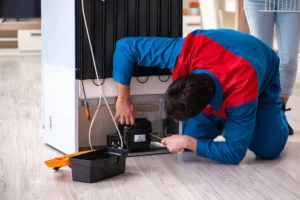
By Admin
Refrigerator not cooling? Discover expert tips and simple solutions to troubleshoot your fridge issues effectively. Learn about the common causes behind cooling problems and the most effective fixes to restore your refrigerator’s cooling efficiency, ensuring it works like new again.

A refrigerator not cooling can be incredibly frustrating, especially when you rely on it to keep your food fresh. The issue may range from something simple and easily fixable to a more complex problem that requires professional help. If you’ve noticed that your refrigerator is not cooling as it should, you’re in the right place to find solutions and troubleshooting tips.
In this post, we’ll discuss the common reasons why your refrigerator may not be cooling and provide step-by-step instructions on how to address these issues. We’ll also look at when it’s best to call for professional help.
Understanding the common causes of a refrigerator not cooling is the first step toward solving the issue. Here are some of the most frequent culprits:
The condenser coils are located at the back or bottom of your fridge. These coils release heat, and if they’re covered in dust and debris, they can’t function properly, which could result in your refrigerator not cooling efficiently.
How to fix it:
The thermostat controls the temperature in your refrigerator. If it’s malfunctioning, your fridge may not maintain the correct temperature.
How to fix it:
Air vents in the fridge allow cool air to circulate. If these vents are blocked by food items, air can’t flow freely, causing your fridge to warm up.
How to fix it:
A faulty or cracked door seal can lead to cool air escaping from the fridge, causing it to lose its cooling efficiency.
How to fix it:
Overloading your fridge can prevent proper air circulation, making it harder for the cooling system to maintain a consistent temperature.
How to fix it:
The compressor is the heart of your refrigerator’s cooling system. If the compressor fails, your refrigerator will not cool at all.
How to fix it:
Refrigerators rely on refrigerant to maintain a cold temperature. If there’s a refrigerant leak, your fridge may stop cooling effectively.
How to fix it:
While many issues with your fridge can be addressed through DIY methods, there are times when it’s best to call for professional help. If you have checked all the basic fixes and your refrigerator is still not cooling, it may be time to contact the a reputed refrigerator repair service.
Here are some signs that indicate it’s time to call a professional technician:
Taking care of your refrigerator can help prevent future issues and ensure it stays in good working condition for years. Here are some useful tips for maintaining your refrigerator:

Q1: How do I know if my refrigerator is not cooling properly?
A: You’ll likely notice the temperature inside the fridge and freezer rising, food becoming warmer, or ice cream becoming soft. A temperature check with a thermometer can confirm the issue.
Q2: Is a refrigerator compressor easy to replace?
A: No, replacing a refrigerator compressor is a complex task that requires professional expertise. It’s best to contact a technician if you suspect the compressor is the issue.
Q3: Can I fix a refrigerant leak myself?
A: No, fixing a refrigerant leak requires specialized tools and knowledge. Always call a professional technician to handle refrigerant-related issues.
Q4: How long does it take to fix a refrigerator not cooling?
A: It depends on the issue. Simple problems like cleaning the coils can be resolved in an hour, but more complex issues like compressor failure or refrigerant leaks may take longer.
Q5: How often should I service my refrigerator?
A: It’s recommended to service your refrigerator at least once a year to ensure it runs efficiently and to avoid major issues.
A refrigerator not cooling can be caused by several factors, from simple issues like dirty coils to more complex problems like a faulty compressor or refrigerant leak. By following the troubleshooting tips mentioned above, you can resolve many of these issues on your own. However, for more serious problems, don’t hesitate to reach out to the Best Refrigerator repair services in Kolkata.
Regular maintenance is key to preventing issues and ensuring your refrigerator runs smoothly for years. Remember to clean the condenser coils, check the door seals, and ensure proper airflow inside the fridge. When in doubt, call a professional to avoid further damage.
If you are experiencing persistent cooling problems with your refrigerator, consulting a trusted repair service can help restore its efficiency and ensure your food stays fresh.